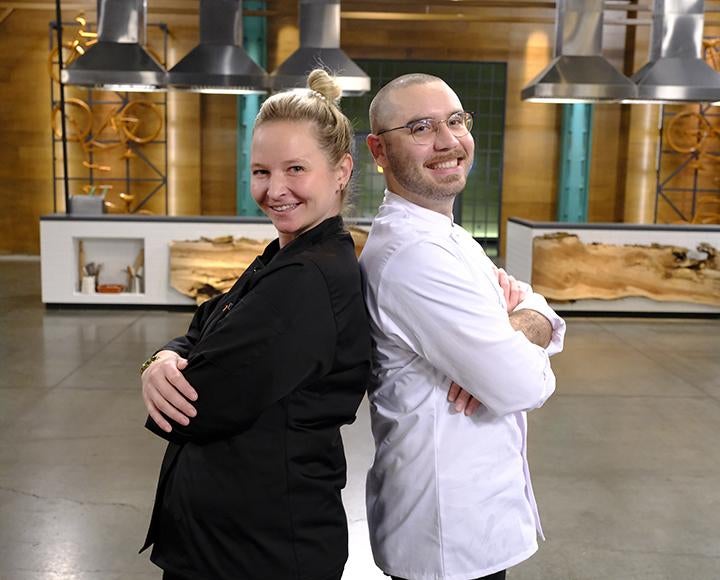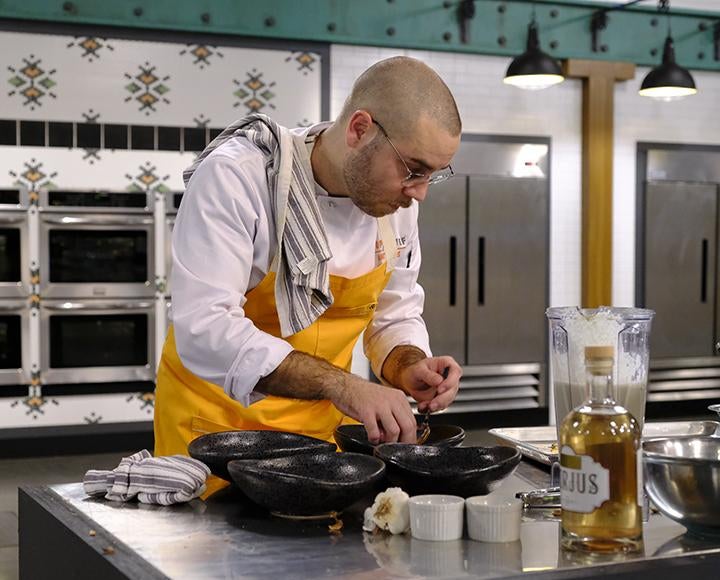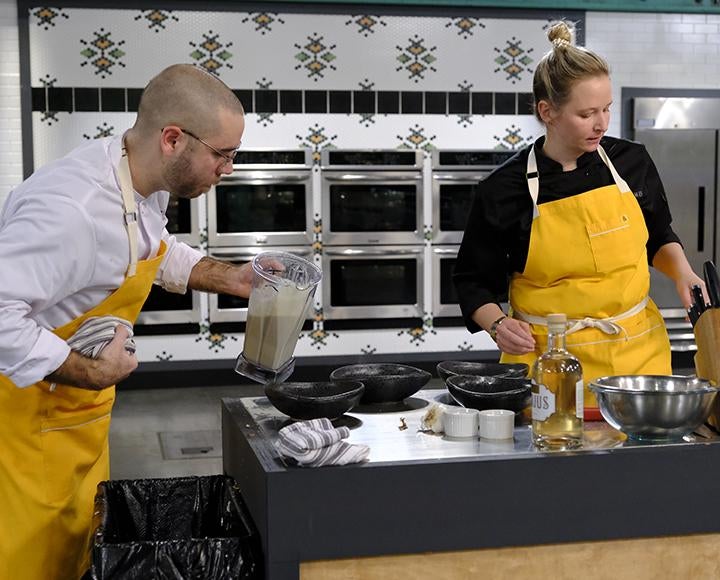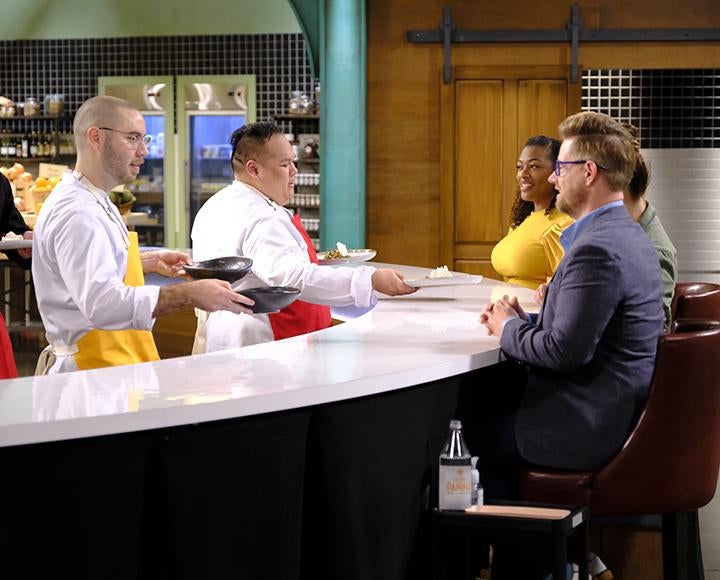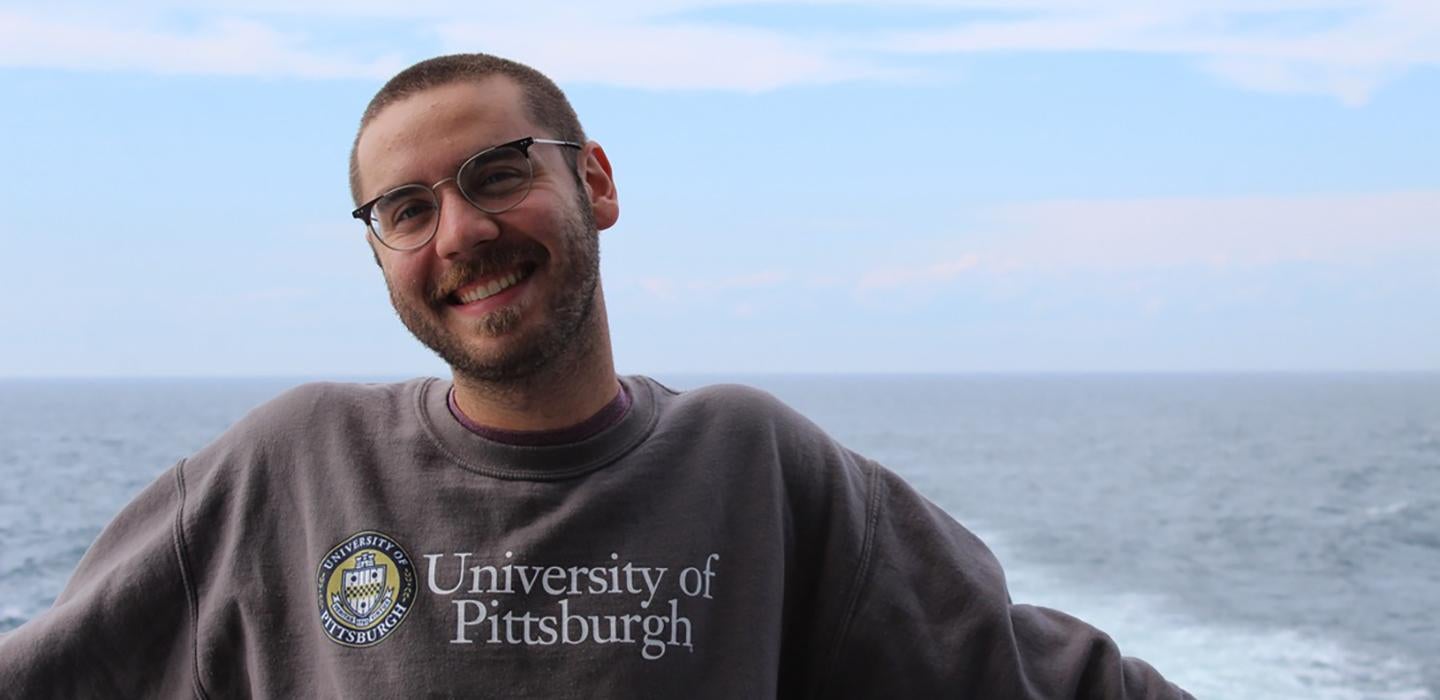
Subscribe to Pittwire Today
Get the most interesting and important stories from the University of Pittsburgh.If psychology graduate student Brett Bankson were to create a dish inspired by the University of Pittsburgh and the city at large, it would be a dish with undeniable character.
"The Pittsburgh salad with fries is one of the funniest, most interesting, cool — and, when done right — transcendental dishes," says Bankson, a budding chef who debuted his talent for cooking on Bravo's "Top Chef Amateurs,” where he won the Sept. 2 competition with chef Stephanie Cmar and brought home $5,000.
To make the Pitt salad his own, Bankson would include pawpaws mustard seed dressing, "endives, or chicories from Joddo, a local Pittsburgh farmer," and a variety of other farmers' market finds.
"People have very rigid and intractable definitions of what salads are, but they can go anywhere," he says.
Much like the Pittsburgh salad, Bankson is defying definitions. In addition to being one of only 24 “home cooks” chosen from across the United States to participate in “Top Chef Amateurs,” he is also a current Pitt PhD candidate in cognitive psychology, part of the Kenneth P. Dietrich School of Arts and Sciences, studying the brain and time.
The road to Pitt
In 2017, Bankson was in Washington, D.C., working as a post-baccalaureate research fellow at the National Institutes of Health (NIH). His advisor, Chris Baker, knew of Bankson's passion for neuroscience research and his plan to pursue a doctoral degree, so he introduced Bankson to Pitt’s Avniel Singh Ghuman, who, ten years prior, spent time in a separate but affiliated NIH lab.
"Our NIH research interests were pretty much an exact match," says Bankson, who uses a technique called magnetoencephalography to study the temporal dynamics of visual processing in the human brain. In other words, he explores questions about the time course of brain function and activity.
In both Ghuman — who joined Pitt's Department of Neurological Surgery in 2011 — and Ghuman’s research, Bankson found scientific symmetry.
"He was asking the same questions, but in neurosurgery and working with epilepsy patients," says Bankson. "The opportunity to continue asking similar questions with similar analytic methods, similar analysis, but in this specific and rare patient population" was so enticing that he added Pitt to his list of prospective schools.
"My previous advisor and colleagues told me: 'your future is going to be difficult in ways that you cannot imagine. Don't think about how difficult it is, but where you can discover new depths of difficulty.’"
Soon after, he made his decision.
"Pittsburgh — it felt like the right place. I fell in love with the whole city."
Bringing the heat
Ciara Willett, Bankson’s friend and former roommate whom he met through his cognitive psychology program brought the “Top Chef” opportunity to his attention. Last summer, Willett came across the casting call and shared it with Bankson. He immediately applied.
Of the experience, he says, “I walked in excited and [hoping] my hands work. Barring that, it was surreal; this is the headspace I enjoy being in."
His first time cooking for a notable audience was actually not with "Top Chef Amateurs," but at Pitt. Saddled with "an insatiable palette" and the constant desire to try something new, Bankson leveraged his Pitt peers — bonded by shared demands of doctoral study — to test and flex his culinary skills.
Bankson spent weekends cooking for his pals in psych, with the group rotating houses and hosting duties.
“Their willingness to allow me to flesh out ideas that I can’t verbalize, but that I can put into food — that's what my friends in Pittsburgh gave me — the opportunity to pursue cooking,” he says.
Bankson also credits his cohort for his first professional gig. He curated a meal for the cognitive program's grad student committee, armed with a few hundred bucks, vision and support from peers — the community he'll "have for the rest of my life." After this, offers to cook for academic receptions and events across campus were commonplace.
But balancing life, school and cooking amid the pandemic soon proved challenging. Unable to see his family because of COVID-19, depression set in. Doubts about his ability to complete his PhD program arose, until he spoke with Ghuman.
"We had a good conversation about the next steps forward," says Bankson. "He was supportive, reassuring and open to figuring out the best outcome.”
That conversation and a series of others with lab managers and friends reminded him that everyone's journey is different, Bankson said, which helped him to discover his newfound trajectory and happiness.
Now, in the final year of his PhD program, he is preparing for a career in catering. Participating in “Top Chef Amateurs” opened doors to a new community and impacted his view of his time at Pitt.
"I view it more fondly because I had the time, the professional space to launch myself into cooking in very flexible ways."
Though some might consider the gap between academia and the culinary arts vast, Bankson finds similarities between the emotional landscape of the two disciplines, noting "the same, compelling flavors of anxiety and joy."
— Kara Henderson
